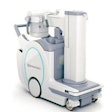
The COVID-19 pandemic created new challenges for radiologists, but practices can help ease the burdens faced by their employees, a presenter explained on June 10 at the AHRA annual meeting.
 Brenda Rinehart, PhD.
Brenda Rinehart, PhD.In her talk, Brenda Rinehart, PhD, from GraceStone Professionals in Seattle talked about steps that practices can proactively take to reinforce teamwork and ease the physical and mental burdens faced by radiologists.
"I've seen a lot of change in radiology, with many radiologists feeling disenfranchised," Rinehart told AuntMinnie.com. "You can't be a great leader if your tank is empty. They [radiologists] are people too. Sometimes, they're not seen that way."
Radiologists are part of the front line when it comes to diagnosing patients with COVID-19. While serving an important role, radiologists have also had to endure the chaos that comes with the pandemic, including a large influx of patients presenting with COVID symptoms and patients catching up with their regular screening.
This leaves radiologists exhausted, with some leaving the field altogether. Medical practices meanwhile are trying to adjust to the "new normal" while also dealing with staffing issues, budget shortfalls, and limited resources.
"It is important that we realize what is at stake and, in response, provide our employees and ourselves with tools to build up our resilience, reduce our stress, and equip ourselves with the skills to successfully come out of this crisis better than when we began," Rinehart said.
Rinehart presented eight steps for administrators to take to promote this realization.
Combat emotional exhaustion: Prioritizing restful sleep, nutritious foods and supplements, and exercise can help with the emotional and physical characteristics caused by exhaustion.
Practice mindfulness: Being nonjudgmental and aware of one's own present experience can help ease negativity. Rinehart said mindfulness exercises focusing on deep breathing, meditation, awareness, active listening, and biofeedback, among others, can help with this.
Maintain a sense of agency: Rinehart said controlling one's own life and making one's own choices can help establish a sense of agency. Examples include learning new skills and taking responsibility for one's own actions. "One may not be able to control the weather, but one can prepare by packing an umbrella," Rinehart said. "Packing an umbrella is a choice. Choices reestablish our sense of agency."
Build a support system: Building relationships and creating a network of people can help in good and bad times, Rinehart said. These can be created in the workplace as well as in family and community settings.
Depend on personal faith: Rinehart also said honoring one's own beliefs and faith-based practices can be a powerful resilience-building tool. She cited an Australian study showing faith-based interactions among family and community members lead to more emotional stability.
Communicate often and with compassion: Empathetic, open, honest communication is needed, with touch points needed multiple times a day in crisis situations, Rinehart said. She added that grace and compassion should be given to team members. "Information is power and can alleviate fear and stress," Rinehart said.
Reestablish team dynamics: Leaders can build team cohesiveness by asking team members what they need, actively listening, and responding with empathy. Rinehart said leaders can build connections with their team members through examples such as trusting employees to work independently from home, providing greater flexibility with hours due to family hardships, and celebrating birthday and potluck lunches.
"A great leader helps their employees to see their choices in these situations and to understand the factors that contributed to the decision-making process, while giving credit to the organization and their team members as well," she added.
Collaborate with colleagues: Rinehart said that social support is another critical variable that contributes to building resiliency. Work colleagues can provide support and offer opportunities to share differing points of view and gain assistance. Support through professional organizations can also help grow professional interests for individuals, as well as establish a sense of community.




















